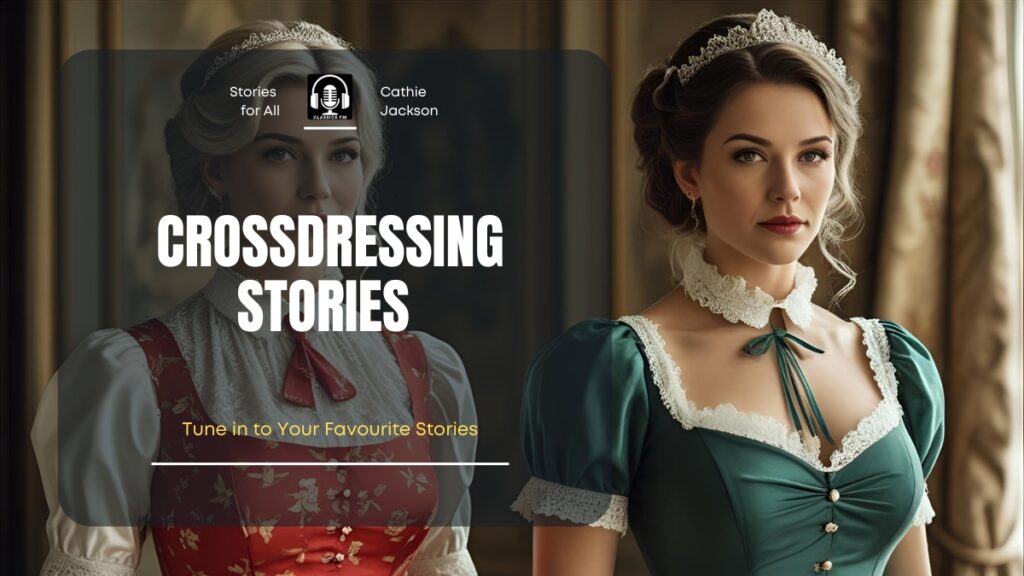Greek myths can feel like old, dusty stories about gods and monsters. But they’re really stories about people — about what they hoped for, feared, and fought over.
For high school students, Greek Mythology Stories for High School Students isn’t just a list of names to remember.
It’s a way to see how people tried to explain the world and their feelings.
These myths ask big questions: Why are we here? What makes something right or wrong? How do we handle pride, love, or fear?
They’re full of mistakes and lessons. Heroes who try and fail. Gods who learn nothing. Ordinary people who surprise everyone.
Read them for the action. Read them for the drama. But read them, too, for the ideas — the bits that make you think about your own choices.
Stick with these stories. They’re older than your phone — and somehow still useful.
Why Mythology Matters
Why should you care about myths? They can feel old and weird. But myths are like the ancient way of thinking. Back then, people didn’t have science classes or weather reports. They watched nature and made stories to make sense of it. Those stories helped people feel less confused and more connected.
Myths also show how people handled problems. They teach ideas about fairness, bravery, and what happens when someone gets too proud. For students now, that still matters. Myths show that people have always wondered about the same things we do.\
Greek Mythology Stories for High School Students
Ever wondered how gods, monsters, and heroes shaped the world with their epic battles and daring adventures? Dive into Greek mythology and discover stories full of magic, mystery, and lessons that still matter today!
The Painter Who Brought Statues to Life
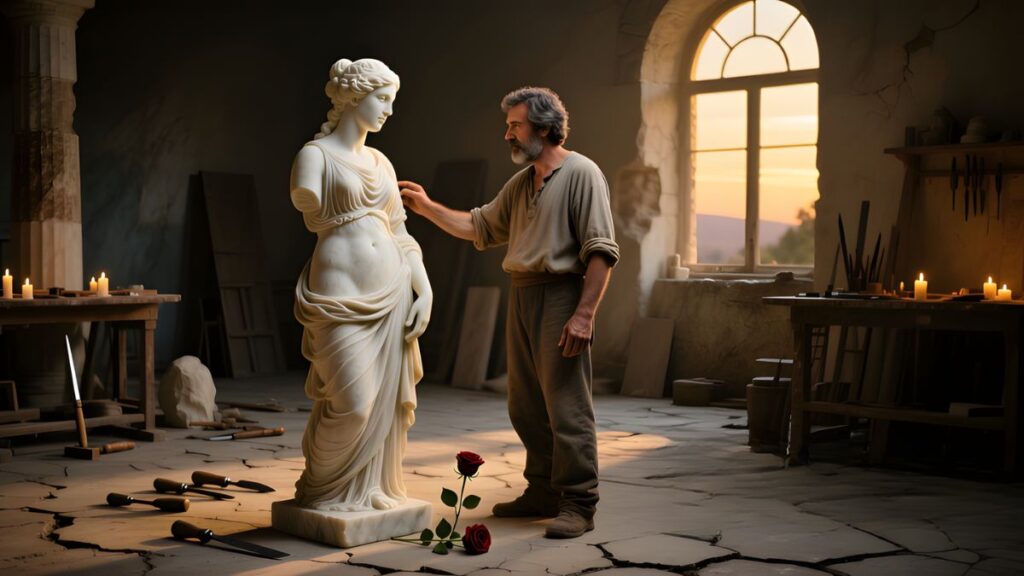
Lina loved her grandfather’s workshop.
It smelled of paint, clay, and old wood.
Sunlight fell through dusty windows in golden beams.
Every corner held something curious. Brushes, jars, half-finished sculptures, and stacks of old canvases.
Other teens rushed past school hallways. Lina stayed here.
Here, she could create.
She painted small clay figures for hours. Birds, rabbits, tiny heroes.
Each stroke was careful. Each figure had a spark of life—almost.
Almost.
She wanted more. She wanted magic. Real magic.
One rainy afternoon, Lina climbed the attic stairs.
Cobwebs brushed her face.
She liked the quiet. It made the world feel distant.
A wooden box caught her eye.
It was small. Etched with swirling designs. Ancient designs.
She lifted the lid.
Inside lay a brush. Its bristles shimmered faintly.
The handle seemed to hum.
Lina’s heartbeat quickened.
“Grandfather?” she called.
He appeared, frowning.
“Where did you find that?”
“Just… here.” She held it up.
His eyes softened. Then narrowed.
“That’s no ordinary brush,” he said.
Lina tilted her head. “What do you mean?”
“Legend says it belonged to a god of art. Whatever it touches… might not stay still.”
“Stay still?” she repeated.
He sighed. “It brings creations to life. But it tests the artist’s heart. Careless use… can bring chaos.”
Lina’s pulse raced.
Alive… statues that could breathe…
She swallowed nervously.
“I’ll be careful,” she promised.
The first stroke was shaky.
She painted a small fox.
Its clay body shimmered.
Its eyes glowed amber.
It twitched.
Then leapt off the pedestal.
Lina stumbled back.
“You… you’re alive?”
The fox tilted its head. Curious. Playful.
It ran in circles, ears twitching.
Lina laughed, heart pounding.
She couldn’t believe it.
Days passed.
She experimented cautiously. Birds that sang. Rabbits that bounded. Tiny warriors that marched.
The workshop buzzed with life.
It was beautiful.
Then, pride crept in.
She imagined filling the world with living art. Adored by everyone.
She painted bigger. Bolder. Faster.
The first mistake came at night.
She painted a lion. Massive. Proud. Majestic.
It roared.
Windows shook. Paint jars rattled. The foxes scattered.
Lina froze.
Its eyes glowed gold.
The lion prowled.
She backed away.
Panic surged.
She tried to calm it.
It growled.
Then, unexpectedly, the fox darted forward.
It barked. Nipped at the lion’s paw.
The lion paused.
Slowly, it settled.
Lina’s heart slowed.
Her creation had saved her.
She realized the brush demanded respect.
The next day, Lina began cleaning.
Broken clay lay everywhere.
Spilled paint coated the floor.
She picked up her foxes, whispered apologies to the tiny warriors.
The lion slept, but she could feel its golden eyes on her.
She reflected.
Magic wasn’t power.
It was responsibility.
She couldn’t rush creation. She had to understand it.
Weeks passed.
Lina painted differently now.
Slower. Thoughtful. Careful.
She studied each figure she created. Birds learned to fly. Rabbits hopped in patterns. Warriors trained with discipline.
The lion became calm and proud.
Her workshop became a quiet sanctuary.
Every creature had a place.
Every stroke had purpose.
Word spread about Lina’s talent.
People came to see her art, unaware of the secret magic behind it.
Her statues seemed alive.
Movement, emotion, soul.
She smiled.
She had learned the hardest lesson.
Creation wasn’t about showing off.
It was about understanding life—even the smallest life.
One evening, she painted a tiny girl holding a lantern.
The lantern glowed.
The girl waved.
Lina realized art was a bridge.
It connected imagination and reality.
It demanded patience.
It demanded respect.
It could teach courage, empathy, and care.
The magical brush had tested her heart.
She had passed.
Years later, Lina passed the brush to another young artist.
She whispered the same warning her grandfather gave her.
“Creation is a gift. Handle it with care. Or it may escape your control.”
Somewhere in her workshop, the fox curled up beside the lion.
Birds nested on shelves.
Tiny warriors patrolled the corners.
The girl with the lantern waved from her perch.
Life and art existed together.
In harmony.
And Lina, now wiser, smiled.
Her dream had come true.
But not because of magic.
Because she had learned the greatest truth:
To create is to care.
To bring life to art, one must first bring heart.
Her workshop glowed in the sunset.
Golden light danced on the living creations.
They were alive, yes.
But so was she.
The brush had shown her the path.
She would never forget.
Not the magic.
Not the chaos.
But the lesson.
The gift.
The responsibility.
And so Lina painted on.
Each stroke thoughtful. Each creature cherished.
And every day, she remembered that life—real or clay—deserved respect.
Her art lived.
She lived.
And together, they thrived.
The Whispering Oak
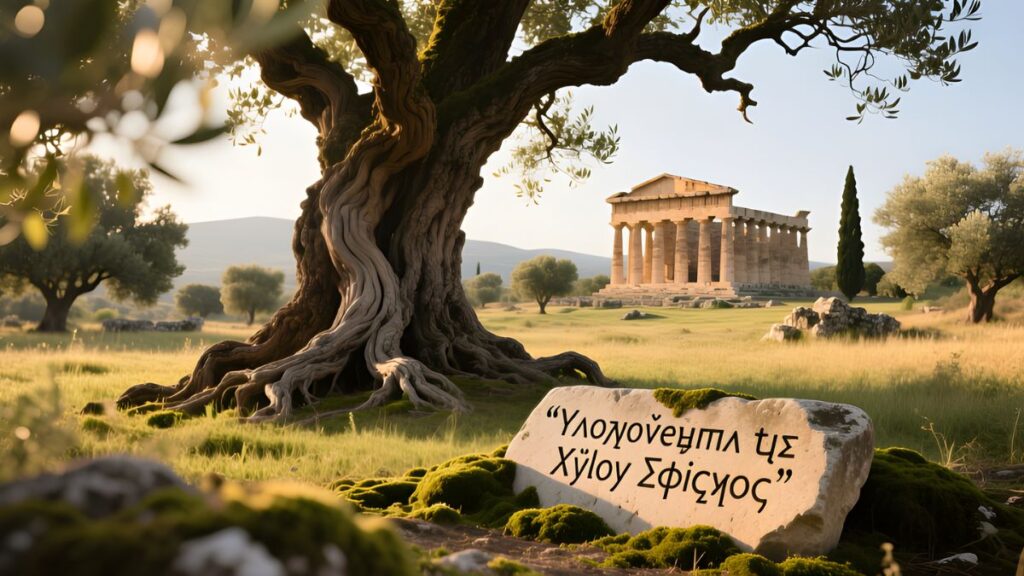
Eli loved exploring.
He wandered through the forest behind his school every afternoon.
The trees were old, taller than any building in town.
Sunlight trickled through leaves like liquid gold.
Most kids avoided the woods.
Too quiet. Too mysterious.
But not Eli.
He liked the quiet.
He liked the mystery.
One afternoon, he noticed something different.
A massive oak stood alone in a clearing.
Its trunk was wider than his classroom door.
Its branches twisted like ancient hands reaching for the sky.
Eli had never seen it before.
He stepped closer.
The air felt thicker.
The wind whispered, or maybe it was the tree.
A low voice rumbled.
“Who approaches me?”
Eli froze.
“I… I’m Eli,” he said, his voice trembling.
“Curious child,” the voice said. “You have courage. But courage alone is not enough.”
Eli’s eyes widened.
The oak… was speaking.
“I can share secrets,” it continued. “Stories of heroes long forgotten. Tales of courage, wisdom, and sacrifice. But first… you must answer my riddles.”
Eli swallowed hard.
Riddles? He loved riddles.
“Ask,” he said.
The oak’s bark shimmered.
“I have roots deep, yet never move. I have wisdom, yet never speak unless asked. I have seen ages pass. What am I?”
Eli thought.
He looked at the oak, the sunlight, the forest floor.
“An oak?” he guessed.
The tree rumbled a laugh.
“Close. Very close. But I am more than one. I am all ancient trees, all witnesses of time. But your answer shows thought. You pass the first test.”
Eli’s heart raced.
“Another?” he asked eagerly.
“Yes. A second test,” the oak said. “A hero once faced fear without hope. They acted not for glory, but for others. What is the courage that does not seek reward?”
Eli hesitated.
He remembered his little sister, trapped in a storm last week. He had run to save her.
Courage. Real courage. Selfless courage.
“The answer… is selfless courage?” he said.
The oak shook its branches.
“Correct. You understand. But now… the final test.”
Eli held his breath.
“I speak only truth. I reveal only honesty. You must answer without lies or evasion. Are you ready?”
“I… I am,” Eli said.
The oak’s leaves rustled like applause.
“Tell me, Eli. If you could change the past, would you? Or must the lessons of history remain?”
He thought of mistakes he’d made.
Of friends he’d hurt.
Of times he’d lied to avoid trouble.
“I… I must not change the past,” he said finally. “Even if it hurts. Lessons must remain. They teach us who we are.”
The oak sighed—or it seemed to.
“You speak well. You are ready.”
A hollow opened at the base of the trunk.
Inside, carved into the wood, were names.
Heroes forgotten. Warriors unsung. Scholars unseen.
Eli ran his fingers over them.
Stories whispered from the oak.
A hero who saved a village from a dragon.
A young girl who solved a riddle to save her people.
A soldier who sacrificed glory for peace.
Each story was brief, yet powerful.
Eli listened, enraptured.
“You may return anytime,” the oak said. “But remember, stories are not trophies. They are lessons. Share them wisely.”
Eli nodded.
He left the clearing slowly, the whispers following him.
At school, no one noticed anything.
But Eli felt different.
He walked taller. He spoke with more care.
He noticed courage in small acts.
He noticed honesty in difficult words.
He noticed the power of selflessness.
Days passed.
Eli returned to the oak.
More riddles awaited.
Each one tested him differently.
One asked about loyalty.
One asked about forgiveness.
One asked about hope.
He struggled. He stumbled. He learned.
The oak rewarded honesty with stories.
Stories of heroes who had once been ordinary like him.
Stories of courage that had changed the world.
One afternoon, he brought his best friend, Mara.
“Are you sure about this?” she whispered.
“Yes. You’ll see,” Eli said.
The oak greeted her.
A new test appeared.
Mara solved it cleverly.
The oak shared another secret.
Eli realized then: the oak didn’t just test knowledge or bravery.
It tested hearts.
It revealed character.
Word spread quietly through their town.
Stories began to inspire students at school.
Small acts of courage became common.
Friendships grew stronger.
Truthfulness became valued.
The forest became a sanctuary.
Not because of magic alone.
But because courage, honesty, and kindness were being remembered.
Eli returned often.
Sometimes alone, sometimes with friends.
The oak whispered stories.
It shared forgotten heroes.
It challenged the curious.
It rewarded the brave.
Years passed.
Eli grew. He remembered every riddle. Every lesson. Every story.
He shared the stories in school projects.
He told them to younger students.
He wrote them down in journals.
The oak remained, patient, watching, waiting.
New students came. New hearts were tested.
Eli smiled, knowing the magic was not just in the tree.
It was in courage, honesty, and learning.
Even ordinary people could be heroes.
Even forgotten heroes could teach the living.
And the Whispering Oak whispered on.
Always watching. Always teaching.
The Starlight Messenger
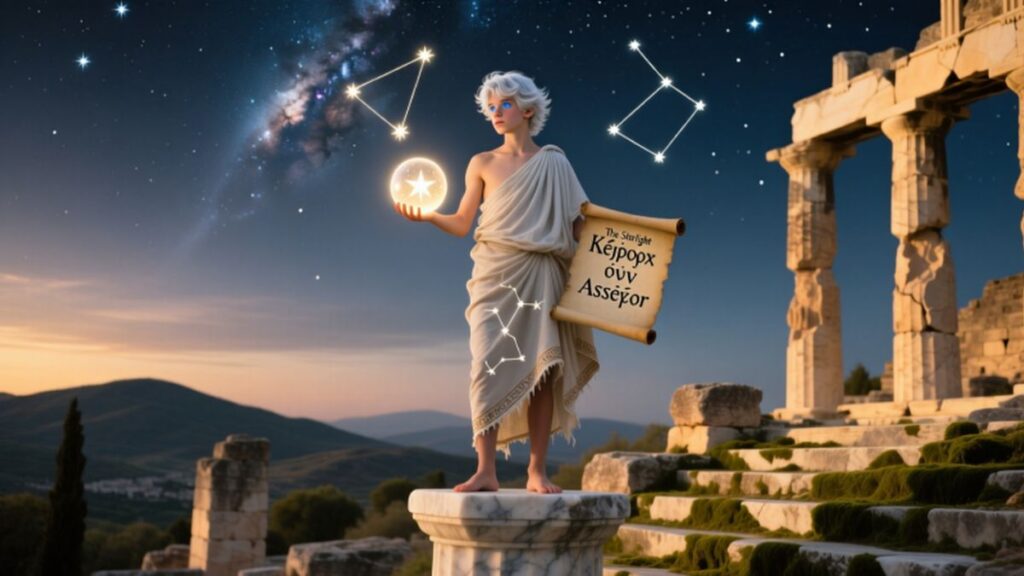
Lyra had always looked at the stars.
Every night, she lay on the hill behind her village.
The sky stretched endlessly, dotted with sparkling lights.
She imagined stories in each star.
Heroes. Monsters. Gods.
She loved stories.
But she never thought she would live one.
One evening, as the sun dipped below the horizon, Lyra noticed a light brighter than the rest.
It hovered above the tallest hill.
It pulsed gently, like a heartbeat.
Curious, she ran toward it.
The light grew. Warm. Gentle.
Then, a voice spoke.
“Lyra.”
She froze.
Her name… spoken by the stars?
“Yes,” the voice continued. “I am Hermes, messenger of the gods. You have been chosen.”
“Chosen?” Lyra whispered.
“To deliver messages across the night sky. To carry guidance from the gods to mortals. Your actions will shape destinies.”
Lyra’s heart raced.
“Me? Why me?”
“Because you see the world clearly. You notice small things. You understand that even small choices matter.”
Lyra nodded slowly.
Hermes handed her a glowing scroll.
“Your first message,” he said.
Lyra hesitated.
“What if I make a mistake?”
“The gods have faith in you. So must you.”
The scroll glowed brighter.
Lyra touched it.
Suddenly, she felt weightless.
The world fell away.
She soared above mountains, rivers, and villages.
The stars guided her path.
She passed constellations she had only admired.
They whispered secrets. Names of heroes. Forgotten events.
The first kingdom she approached was small, threatened by a looming drought.
The message she carried contained advice: a warning of water shortage, guidance to dig reservoirs, and a hint to share food with neighboring villages.
Lyra hesitated.
Small choices could make huge differences.
She descended, releasing the message.
Below, villagers noticed. They acted immediately.
Crops were saved. Families fed. Lives preserved.
Lyra smiled, feeling warmth spread through her chest.
But the work was not easy.
Some kingdoms ignored the messages.
Some people doubted.
Some challenges tested her.
One night, she approached a mighty kingdom at war.
The king was stubborn. Prideful.
The message advised peace.
Lyra faltered.
If she delivered it incorrectly…
The wrong choice could start a war.
Her hands shook.
She breathed deeply.
She remembered Hermes’ words.
Even small choices matter.
She released the message with care.
The wind carried it to the king’s council.
One thoughtful minister read it aloud.
The king paused.
He listened.
He chose diplomacy.
War was avoided.
Lyra felt relief.
But she also understood the weight of responsibility.
Each scroll, each journey, shaped the world in unseen ways.
Some nights, Lyra would pause in flight.
She looked at the villages below.
She saw children laughing. Farmers tending crops. Soldiers guarding borders.
Her heart ached with the knowledge that one wrong move could change everything.
Yet, with each success, confidence grew.
Lyra learned patience.
She learned observation.
She learned that courage was not always loud.
Sometimes, it was quiet. Careful. Thoughtful.
Months passed.
Lyra became known among the gods.
Her name whispered in Olympus.
She was young. Ordinary. But her deeds were extraordinary.
One night, she received a different kind of scroll.
No advice. No guidance.
It was a choice.
“Decide the path of a kingdom,” Hermes said.
Lyra trembled.
She read the scroll carefully.
The king had two paths. One easy, one hard.
The hard path required sacrifice. Long-term growth.
The easy path promised comfort. Short-term gain.
Lyra’s heart ached.
The choice was heavy.
She remembered the lessons from the first kingdoms.
Small choices shift the fate of entire kingdoms.
She chose the hard path.
Her hands glowed as she released the message.
The kingdom accepted the challenge.
It struggled at first. Crops were difficult to grow. Roads needed repair. People questioned decisions.
But over time, the kingdom thrived.
Lyra watched from the stars, proud.
She realized that the gods’ trust was not just a gift.
It was a test.
Her choices could save lives. Could teach lessons. Could shape the future.
Lyra continued her journeys.
Each night, a new scroll. A new kingdom.
Some were easy. Some were hard.
Some tested courage. Some tested honesty.
She learned to listen. To think. To act with care.
Even the smallest action mattered.
Years passed.
Lyra became a legend among mortals.
The girl who flew among the stars.
The girl who delivered hope.
The girl who reminded kingdoms that even ordinary people can change the world.
But Lyra remained humble.
She remembered the first night.
The glowing scroll. Hermes’ words.
Even small choices matter.
Even small voices can carry across the night sky.
And so she continued.
Flying through the constellations.
Delivering guidance.
Saving lives.
Teaching lessons.
Her heart remained true.
Her courage quiet but unwavering.
The stars shone brighter for her.
And each night, when mortals looked up, they felt a sense of hope.
A message carried silently across the sky.
A reminder that choices, no matter how small, ripple across the world.
Lyra smiled.
She knew she had been chosen.
And she would honor that choice.
For the stars, the kingdoms, and the people below.
And in the silence of the night, as she flew past constellations old and new, she whispered:
“I will not fail.”
The Forgotten Arena
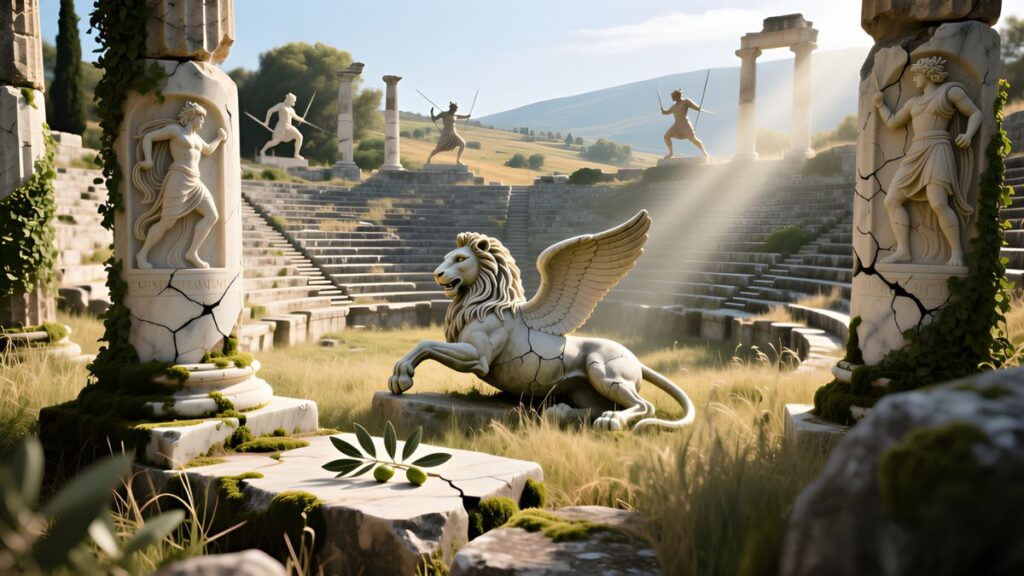
The sun beat down on the edge of the forest.
Four friends jogged through the trees.
Maya, Jaden, Suri, and Leo.
They were athletes, always pushing each other.
Always competing.
Maya led the way.
“Race you to the clearing!” she shouted.
“Loser buys lunch!” Jaden yelled back.
Suri rolled her eyes.
Leo laughed.
They ran.
The forest opened into a wide, hidden clearing.
Stone steps curved into a massive arena.
Columns rose, cracked with age.
Vines curled around broken statues.
The air thrummed with energy.
“This… is incredible,” Suri whispered.
Maya’s eyes widened.
“Do you think… gods trained here?”
Leo laughed nervously.
“Yeah, right. Probably just some old stadium.”
But the energy felt alive.
The arena seemed to breathe.
The center of the arena had a raised platform.
A voice boomed.
“Welcome, challengers.”
The friends froze.
The voice came from nowhere.
“Who dares enter the arena of champions?”
Maya stepped forward.
“We… we’re just exploring.”
The ground shook lightly.
“Exploring is no longer enough. You will face trials. Tests of pride, teamwork, and strength. Only those worthy will leave.”
Suri swallowed hard.
“Trials? Are we… ready?”
“Only one way to find out,” the voice said.
The first trial began.
Stone pillars rose from the ground.
Obstacles moved in patterns.
A shadowy figure appeared.
It mimicked their every move.
“You must work together,” the voice warned.
Maya charged ahead.
Jaden followed, trying to be faster.
Suri hesitated.
Leo stayed back.
The shadow mirrored them perfectly.
When they rushed individually, they failed.
They tripped. Fell. Collided.
“Stop! We can’t do this alone!” Suri yelled.
Maya’s pride flared.
“I’m the fastest! I can handle this!”
The shadow laughed.
“Pride blinds you.”
They tried again.
This time, they coordinated.
Maya led. Jaden supported. Suri directed. Leo analyzed.
Step by step, they moved in sync.
The shadow faltered.
The first trial ended.
The voice boomed approval.
“Lesson one learned. Pride alone is weakness. Teamwork is strength.”
They rested.
The second trial was harder.
A wall of fire erupted.
Ropes dangled from above.
They had to swing, climb, and leap.
Fear gripped them.
Leo faltered first.
“I can’t—” he gasped.
Suri grabbed his hand.
“You can. We’ve got this together.”
Maya hesitated.
“I’ll go first,” she said.
Jaden shook his head.
“No. We all move together. We fail together. We succeed together.”
Step by step, rope by rope, they climbed.
Fire roared beneath them.
Sweat dripped down their faces.
They supported each other.
At the top, the arena ground shook.
The fire vanished.
The voice spoke.
“You have learned courage. You have learned trust.”
The final trial awaited.
A maze of mirrors.
Each reflection showed their deepest fears.
Maya saw herself failing in front of a crowd.
Jaden saw himself alone.
Suri saw betrayal from friends.
Leo saw weakness he couldn’t overcome.
They froze.
The voice whispered.
“To overcome, you must see truth. Not fear.”
They stepped forward together.
Maya faced failure. She embraced it.
Jaden faced loneliness. He accepted it.
Suri faced betrayal. She forgave it.
Leo faced weakness. He fought through it.
The mirrors shattered.
A light filled the arena.
The friends felt stronger.
They laughed, exhausted but triumphant.
“You… have passed all trials,” the voice said.
Stone statues of ancient champions moved.
They bowed to the teens.
“You have proven yourselves. Courage, teamwork, and self-knowledge are your rewards. Remember them well.”
The arena trembled.
The friends ran down the steps.
The sun shone brighter outside.
They looked at each other, changed.
No longer just athletes.
Now, champions in their own right.
The arena faded behind them.
Vines and stone blended with the forest.
It seemed the gods had hidden it again.
But the lessons remained.
Weeks later, at school, their training felt different.
They worked together, not just to win, but to improve.
They faced challenges without fear.
They trusted each other.
They discovered strengths they never knew they had.
One afternoon, Maya glanced at the forest.
“Do you think we’ll ever see the arena again?”
Leo smiled.
“Maybe. Or maybe the lessons were the real prize.”
Suri nodded.
“Either way, we’re stronger than before.”
Jaden laughed.
“Yeah. Champions in our own right.”
And they were.
Not because of medals.
Not because of trophies.
But because they had learned humility, teamwork, and courage.
And sometimes, when the wind rustled through the trees, they thought they heard whispers.
Ancient voices, reminding them.
The arena might be gone.
But its trials had changed them forever.
The gods had watched.
And they were pleased.
The Shadow of the Moon Goddess
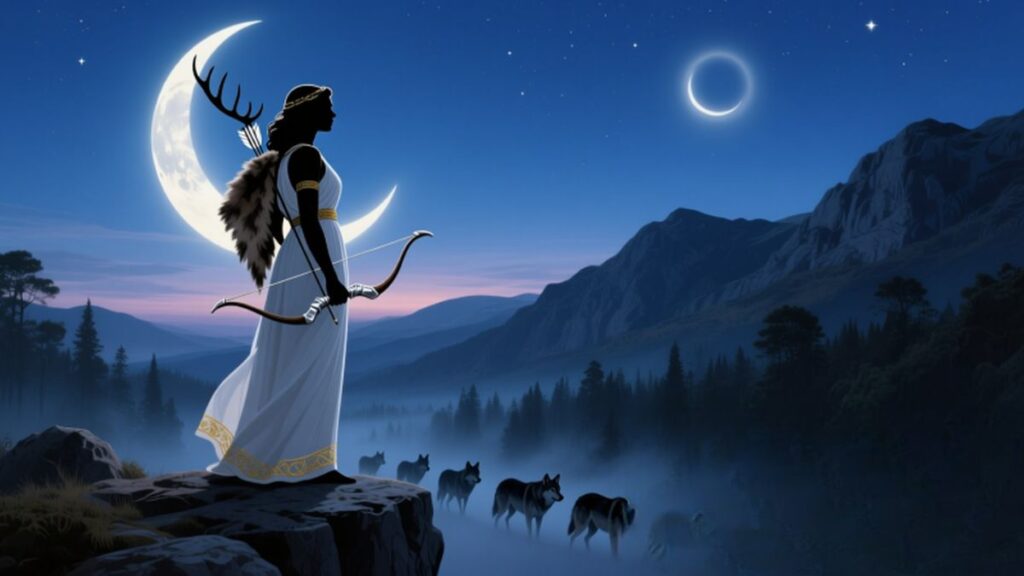
Kian loved the night.
He wandered hills under moonlight.
Silver light washed over the grass.
Stars blinked softly above.
One night, a strange glow appeared.
It hovered above a stone circle in the forest.
Kian stepped closer.
A soft hum filled the air.
A shadow flitted across the stones.
It wasn’t his own.
Kian blinked.
The shadow shimmered.
Then darted forward.
Before he could react, it leapt into his jar.
Kian gasped.
A voice echoed softly.
“Who dares trap me?”
Kian dropped the jar.
The shadow twisted inside.
He froze.
“I… I didn’t mean to—” he stammered.
“I am Selene,” the voice said. “Moon goddess. My shadow is yours… accidentally. But to return it, you must journey far.”
Kian’s eyes widened.
“Journey?” he whispered.
“Yes. Through lands mystical and strange. You will meet beings unlike any human. You must learn empathy, courage, and understanding. Only then will you succeed.”
Kian gulped.
He had never left his village.
The shadow’s glow pulsed in the jar.
He took a deep breath.
“I’ll do it,” he said.
The first step was through a forest.
Trees whispered in voices he barely understood.
Leaves swirled around him.
He stumbled upon a pond.
Its water shimmered with colors like liquid moonlight.
A creature rose.
Its skin glimmered. Its eyes were pools of silver.
“I am the Moon Sprite,” it said. “To pass, you must understand fear without fleeing.”
Kian nodded.
The sprite darted forward.
Its movements were quick, almost overwhelming.
Kian froze.
Then he noticed it trembled.
Fear.
Kian realized the creature was as scared as he would have been.
He stepped closer.
“Don’t be afraid,” he whispered.
The sprite paused.
Then smiled.
“You understand. You may pass.”
Kian’s heart raced.
Next, he entered the Misted Valley.
Fog rolled thick and heavy.
Shadows flickered at the edges of his vision.
Whispers echoed.
“You are human. You do not belong,” the voices hissed.
A creature emerged.
Tall. Thin. Eyes glowing.
“I am a Whisper Wraith,” it said. “All humans fear us. Can you see beyond appearances?”
Kian swallowed.
The wraith glided closer.
He noticed its movements were graceful, not threatening.
“I… I see you. I don’t fear you,” he said.
The wraith bowed.
“You have learned empathy. You may proceed.”
Kian felt relief wash over him.
He carried the jar carefully.
The shadow pulsed softly.
Finally, he reached the Silver Mountains.
Snow gleamed like shards of moonlight.
The wind howled.
A figure emerged.
A giant, its skin glistening with frost.
“You bring the shadow,” it boomed. “To return it, you must face what you value most.”
Kian froze.
He thought of his family.
His friends.
His quiet nights under the stars.
He realized what he valued most… understanding, connection, and kindness.
“I… I value empathy,” he said.
The giant’s eyes softened.
“You have learned well. The shadow returns to its goddess.”
Kian opened the jar.
The shadow leapt out.
It shimmered in moonlight.
Selene’s voice spoke softly.
“Thank you, Kian. You have learned empathy. You have grown beyond human limits. Remember this lesson.”
Kian nodded.
He felt lighter, braver, wiser.
The journey had changed him.
Returning home, the forest seemed different.
Gentler.
More alive.
Kian noticed the small creatures around him.
He saw fear in the foxes’ eyes.
Hope in the birds’ songs.
He understood now.
Even beings different from humans had feelings, desires, and fears.
He walked carefully.
Spoke kindly.
Listened closely.
Back in his village, life continued.
But Kian changed.
He treated everyone with empathy.
He understood struggles unseen.
He acted with courage, even when unnoticed.
The shadow never returned, for it belonged to Selene.
But its lessons remained.
Years later, Kian often walked under the moonlight.
He remembered the sprite, the wraith, the giant.
Each encounter had taught him something.
Empathy. Courage. Understanding.
He shared the stories quietly.
Encouraged kindness.
Recognized fear in others.
The world felt richer.
More connected.
He smiled.
Selene watched from above, her silver light bathing the world.
And Kian, boy of the moonlit forest, remembered that even small acts of understanding could change hearts.
Even small acts could ripple across worlds.
He looked up at the stars.
And whispered a promise:
“I will remember. I will honor the lesson. I will carry empathy wherever I go.”
The shadow of the moon goddess had returned.
But its magic lived in him forever.
The Glass Labyrinth
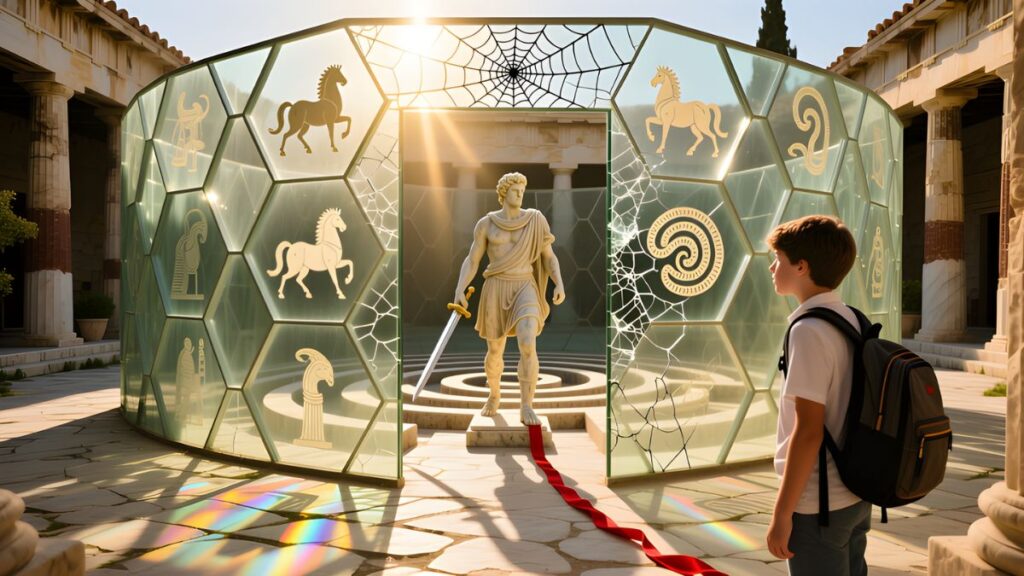
Kai and Liora ran through the forest.
Their younger brother, Finn, had vanished.
One moment he was playing near the creek.
The next, gone.
They searched frantically.
Branches whipped their faces.
Sunlight dwindled behind thick clouds.
Kai spotted a strange entrance.
It shimmered.
Like glass.
The siblings exchanged a glance.
“This… could be it,” Liora whispered.
They stepped inside.
The world changed instantly.
Walls of transparent glass surrounded them.
Floor, ceiling, walls—everything gleamed.
Reflections multiplied endlessly.
They could see themselves a hundred times over.
“Which way?” Kai asked.
Liora shook her head.
“I don’t know. Everything looks the same.”
A soft voice echoed.
“Trust your eyes. Or your heart.”
The glass seemed alive.
They walked cautiously.
Every step echoed.
They turned a corner.
A reflection stepped forward… but it wasn’t them.
Kai jumped back.
“Who—” he began.
The reflection spoke.
“I am your doubt. I show fear. I show hesitation.”
Kai stared.
The reflection smiled.
“You must choose. Trust yourself… or falter.”
He took a deep breath.
“I trust my heart,” he said.
The reflection vanished.
Liora squeezed his hand.
“Good. Let’s keep moving.”
The labyrinth twisted endlessly.
Some corridors split in two.
Some reflected impossible versions of themselves.
One mirror showed Liora leaving Kai behind.
Another showed Kai giving up.
They froze.
“How do we know which is real?” she asked.
Kai thought.
“Maybe… the right path isn’t about what we see. It’s about how we act together.”
Liora nodded.
They pressed on.
A glass bridge appeared above a bottomless pit.
They stepped carefully.
Each reflection seemed to whisper doubts.
“You will fall.”
“You are weak.”
Kai stumbled.
Liora grabbed his hand.
“Together,” she said.
They moved slowly.
Step by step.
The bridge ended safely.
“You’re learning,” the labyrinth whispered.
Next, a hall of twisting mirrors.
Each mirror distorted their faces.
Some monstrous.
Some tiny.
They laughed nervously.
“What if we get lost?” Liora asked.
Kai held her hand.
“We won’t. Not if we stick together.”
They faced illusions—ghostly images of Finn.
Some smiling. Some crying.
Some disappearing as they ran closer.
It was easy to panic.
Kai shook his head.
“We must stay calm. Remember our goal. Finn is waiting.”
Finally, a light appeared.
Warm. Golden.
Finn’s voice echoed.
“Kai! Liora!”
They ran toward it.
The last trial appeared: a mirrored hall with countless reflections.
One mirror showed them arguing.
Another showed them lost.
A third showed them walking apart.
The labyrinth tested trust.
“Do we doubt each other?” Kai asked.
Liora shook her head.
“No. We trust each other. Always.”
They stepped through a shimmering arch.
The reflections shimmered, then vanished.
Finn stood on a pedestal.
The labyrinth hummed approval.
“You have learned trust, perception, and bravery,” the voice said.
They hugged Finn tightly.
Tears streamed down their faces.
“You’re safe,” Kai whispered.
Liora smiled.
“Thanks to each other.”
The labyrinth shifted.
Walls melted into air.
Sunlight poured in.
The forest welcomed them back.
Finn held their hands tightly.
“Where… where was this?” he asked.
Kai shrugged.
“The Glass Labyrinth,” Liora said.
“Or maybe… it was testing us.”
Weeks later, Kai and Liora reflected on the journey.
The mirrors had shown them fear.
They had confronted doubt.
They had relied on trust.
They had chosen courage over panic.
The experience changed them.
They worked together in school, at home, and in life.
They noticed small acts of bravery.
Small acts of honesty.
They valued trust more than ever.
One afternoon, Kai looked toward the forest.
The entrance had vanished.
He smiled.
The lessons remained.
The courage.
The trust.
The understanding of perception.
Liora nodded beside him.
“Even if it returns someday, we’re ready,” she said.
They held Finn’s hands tightly.
And together, they walked home.
The Glass Labyrinth had tested them.
It had taught them.
And they were stronger for it.
Even ordinary siblings could face trials of gods.
Even ordinary humans could learn lessons hidden in reflections.
The forest whispered around them.
The mirrors may return.
The challenges may come again.
But they would remember.
Trust, perception, and bravery were their guides.
And the bond between siblings—stronger than any illusion—would see them through.
The Song of the Wind Spirits

Elin loved music.
She played her flute every morning.
Notes floated across the hills near her village.
Birds seemed to dance.
The villagers smiled.
One afternoon, a sudden wind swept across the valley.
It wasn’t ordinary.
It carried whispers.
Soft, melodic, and strange.
Elin tilted her head.
The wind… sang.
Curious, she played her flute along with it.
The melody matched.
She followed the tune.
It guided her toward the cliffs overlooking the sea.
There, the wind swirled in shapes.
Figures emerged—transparent, glowing.
The Wind Spirits.
“They hear you,” one said.
Elin’s eyes widened.
“You… speak music?”
“Yes,” she whispered.
“The winds carry songs from the past,” the spirit said.
“Ancient songs. Warnings. Secrets. Only those attuned can hear.”
Elin shivered.
“Why me?” she asked.
“You listen,” another spirit replied.
“And you act. Soon, a disaster approaches. Only by decoding our songs can it be prevented.”
Elin swallowed.
A storm was coming. She felt it in the air.
“I’ll do it,” she said.
The spirits whispered a melody.
It was complex. Shifting patterns. Hidden messages.
Elin closed her eyes.
She played the flute.
She repeated the wind’s tune.
Slowly, meaning emerged.
Villages along the coast faced floods.
Fishermen, farmers, children—all at risk.
Elin knew she had to warn them.
She traveled quickly.
She played the melody to the villagers.
Some laughed.
“Wind songs? What nonsense,” they said.
But others listened.
Farmers reinforced levees. Fishermen secured boats. Families prepared.
The winds shifted.
The storm approached.
Lightning split the sky.
Rain poured.
Floods rose.
But the village survived.
Elin breathed in relief.
The spirits appeared again.
“You have acted well,” they said.
Elin smiled.
But then their tone changed.
“Your meddling with fate comes at a cost.”
Elin frowned.
“What… cost?”
“Every song you decode, every action you take to alter destiny, touches the balance. You cannot undo all consequences.”
She shivered.
“Even though lives were saved?”
“Yes. Some losses are inevitable. Some paths altered bring unforeseen change.”
Elin nodded slowly.
She understood.
Powerful gifts demand responsibility.
In the days that followed, Elin continued to listen.
The wind carried messages in soft melodies.
Warnings. Lessons. Hints of what might come.
She acted carefully.
She guided, without trying to control entirely.
Sometimes, her choices prevented harm.
Sometimes, she could only mitigate it.
The villagers began to respect her.
Not for magic, but for wisdom.
Elin realized that listening was as important as acting.
One night, the wind carried a gentle, sorrowful song.
A forest fire would sweep nearby woods.
Elin warned the rangers.
They acted.
Some trees were lost.
Some animals escaped.
The consequences were real.
Elin wept.
Yet she knew she had done what she could.
The spirits whispered in approval.
“You learn the cost,” they said.
Elin learned patience.
She learned humility.
She learned empathy.
And she learned courage.
Months passed.
The winds sang less urgently.
Elin felt more confident.
She traveled the hills, playing her flute.
The notes intertwined with the wind.
Villagers heard her melodies and smiled.
But beneath the joy, Elin remembered the weight.
Every song carried meaning.
Every note could shift fate.
One evening, she played a melody of hope.
The wind responded.
Figures of the spirits swirled in harmony.
“You have grown wise,” they said.
Elin bowed.
“I understand the balance,” she said.
The wind carried her song far.
It soothed forests, guided rivers, and whispered to distant villages.
She realized her music had power.
But more importantly, she understood responsibility.
Years later, Elin still played each morning.
She taught children the melodies of the wind.
She warned them of storms and floods.
She shared stories of courage and listening.
She never tried to control the wind.
Only to understand it.
The spirits watched.
The melodies continued.
Disasters were softened.
Lives were guided.
And the young musician learned that even small acts of courage—paired with wisdom—could ripple across the world.
She smiled at the dawn.
The wind whispered in approval.
And somewhere far away, the song of the wind spirits echoed.
A reminder that choices mattered.
That courage mattered.
And that fate, while mysterious, could be respected—without arrogance.
Elin lifted her flute once more.
And played.
For the wind, for the villagers, and for the balance of all things.
The Gods and Their Human Side
One surprising thing: the gods in Greek myths aren’t perfect. They get jealous. They fall in love. They make bad choices. They act like people.
That makes them easier to understand. If gods can be messy, so can people. Seeing gods with feelings shows that the myths aren’t just fantasy. They’re a way to talk about human behavior. For students, that helps connect old ideas to present life.
Mythology as a Mirror of Society
Myths reflect how people lived. They show what a society valued and what it feared. Myths praised courage, loyalty, and cleverness. They warned against arrogance and hurting others.
In school, you see the same issues: popularity, competition, fairness. Myths can help us think about those things with some distance. They give examples that let us talk about right and wrong without pointing fingers.
Symbols and Metaphors Everywhere
Myths use symbols a lot. A creature, an object, or an event often stands for a bigger idea. That might sound fancy, but it’s simple: symbols make ideas easier to remember.
When you learn how to spot symbols, reading gets richer. A symbol can show fear, hope, or change. Once you notice them, you’ll see symbols in books, movies, and art. That’s a useful skill in school and life.
Influence on Modern Culture
Greek mythology is still all around us. Films, books, and games borrow ideas from myths. Heroes and big battles show up again and again. That’s because the ideas work. They feel familiar and exciting.
Knowing mythology helps you catch references in media. A movie might drop a hint from a myth and you’ll get it. That makes watching or reading more fun. It also helps with essays and class talks when you can connect old ideas to new ones.
Mythology and the Human Mind
Myths tell us a lot about how people think. They show why people fear the unknown, why heroism is admired, and why trickery or cleverness is sometimes praised. Myths give a picture of human feeling and choice.
For students, myths can build understanding. When characters face choices or consequences, it helps you practice empathy. You start to see why people act the way they do, even when it’s messy.
Lessons Without Lectures
Myths teach without being boring. They don’t lecture. They show examples. That’s why they’re powerful. People learn from watching what happens to characters, not from being told rules.
Themes like justice, courage, love, and consequence pop up in myths. They let students think and discuss. There’s rarely a simple answer. That’s good. Real life is messy, and myths prepare you to think through complicated choices.
Mythology as Inspiration
Mythology sparks creativity. Artists, writers, and musicians use myth ideas all the time. The stories give strong images and clear emotions to work with.
If you like creative projects, myths are a goldmine. You can take a theme, change the setting, and make something new. Myth ideas help with essays, art, drama, and even music. They push you to think big and imagine new things.
How to Study Mythology Effectively
Studying mythology doesn’t have to be memorizing lists. Try these simple steps:
- Look for themes – What keeps showing up? Courage? Trickery? Pride?
- Think about characters – What do their choices show about people?
- Connect to today – Where do you see the same ideas in movies, books, or games?
- Spot symbols – Ask what an object or creature might stand for.
- Ask why – Why would people tell this story? What problem were they trying to explain?
These steps turn myths into tools. They help you understand ideas, not just names.
Common Misunderstandings
There are a few common mistakes students make about mythology:
- “It’s just made up.” Myths aren’t science. They’re stories that helped people make sense of things. That still matters.
- “It’s simple good vs bad.” Myths are often complex. Characters can be both brave and foolish. That makes them more real.
- “It’s only for old people.” Not true. Modern stories borrow from myths all the time. Knowing myths helps you understand modern culture.
Seeing myths this way makes them more useful and less dusty.
Mythology in the Classroom
Teachers can make mythology fresh by focusing on thinking, not memorizing. Try these classroom ideas:
- Talk about choices: What would you do?
- Compare with movies: How do modern heroes match myth heroes?
- Create projects: Update a myth idea in a modern setting.
- Use symbols: Have students find and explain symbols.
These activities help students see myths as living ideas, not just old facts.
Why Students Should Care
Greek mythology helps you see patterns in people and culture. It teaches about conflict, ambition, and the way choices bring consequences. Those are things teenagers face every day.
Studying mythology helps with critical thinking, creativity, and empathy. It makes you better at seeing motives and consequences. That’s useful in school, friendships, and later life.
Okay, So What’s the Actual Point?
Here’s the short version: Greek mythology is a toolkit. It helps you understand culture, history, and how people think. It helps you read symbols, see patterns, and think about tough choices.
You don’t study myths to memorize names. You study them to learn how humans explain, cope, and create. That skill works now, whether you’re writing an essay or watching a movie.
Wrapping It Up
Greek mythology isn’t just for old books. It shows up in everything from TV shows to songs. It teaches ideas that still matter: bravery, fairness, curiosity, and the cost of pride.
Even without telling the individual stories, the big themes of mythology teach useful things. They help you think deeper, create better, and understand people around you.
Next time you see a reference to a myth in a movie or a book, you’ll notice more than the name. You’ll see the idea behind it. Mythology is a bridge between the past and the present. It helps us understand people, the world, and maybe even ourselves.


